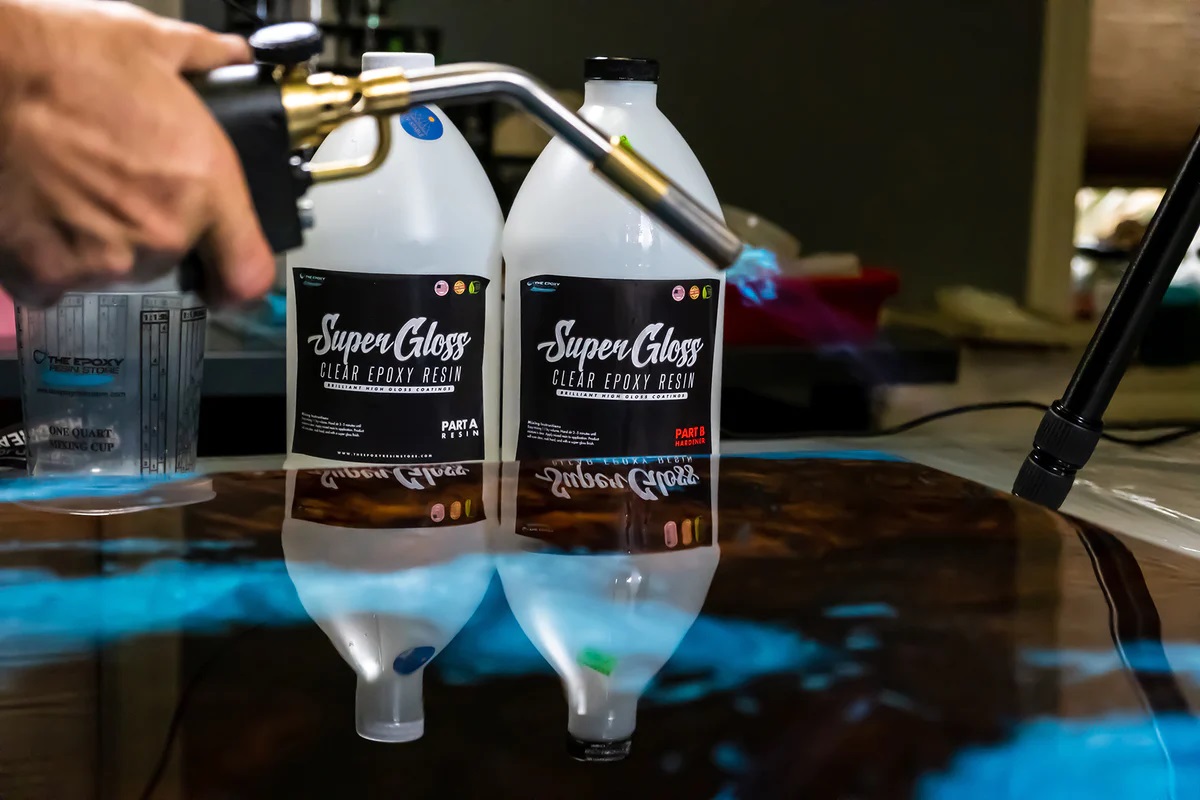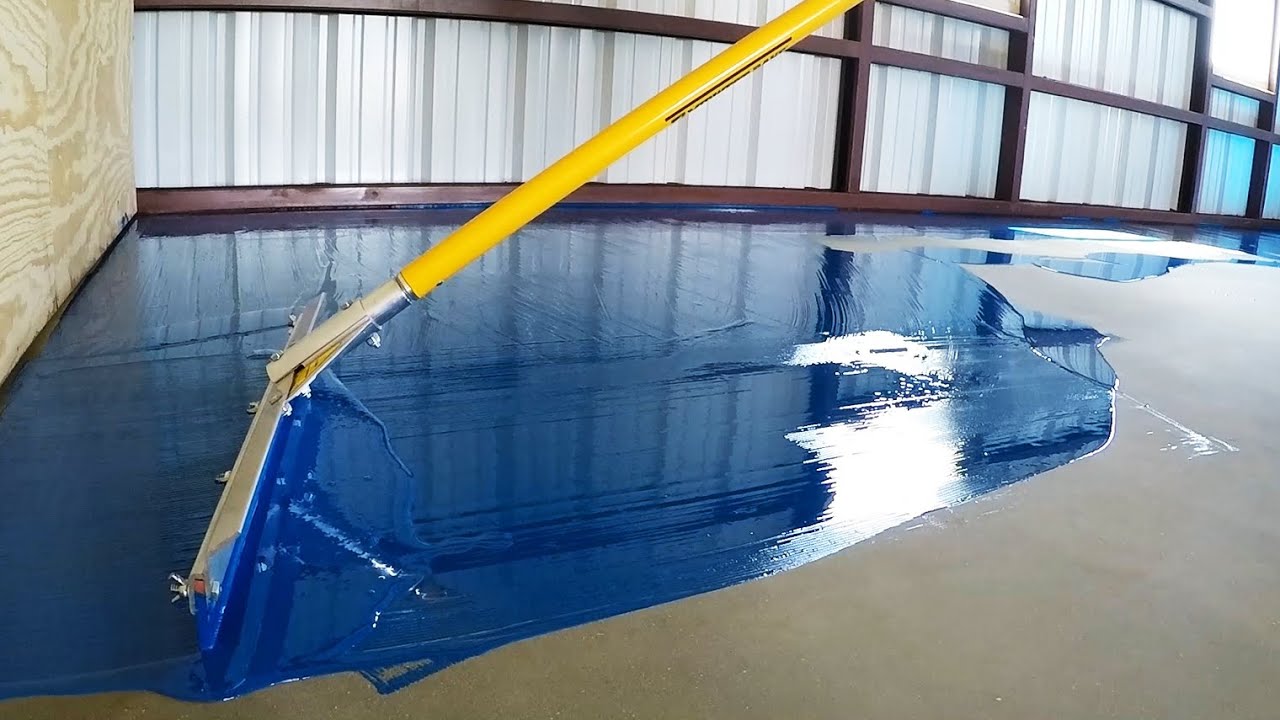

Articles
How To Store Epoxy Resin
Modified: January 6, 2024
Looking for articles on how to store epoxy resin? Find tips and guidelines for proper epoxy resin storage to ensure its longevity and effectiveness.
(Many of the links in this article redirect to a specific reviewed product. Your purchase of these products through affiliate links helps to generate commission for Storables.com, at no extra cost. Learn more)
Introduction
Epoxy resin is a highly versatile and widely used material in various industries, including construction, automotive, and crafts. Its ability to create a strong bond, provide a glossy finish, and resist chemicals and moisture makes it an ideal choice for many applications. However, to ensure the longevity and effectiveness of epoxy resin, proper storage is essential.
Improper storage of epoxy resin can lead to a multitude of issues, including reduced shelf life, degraded quality, and even complete loss of usability. Factors like temperature, moisture, and exposure to light can all have a significant impact on the stability and performance of epoxy resin. Therefore, it is crucial to understand the importance of proper resin storage and the necessary precautions to take.
In this article, we will explore the various factors to consider before storing epoxy resin, recommend optimal storage conditions, discuss suitable containers, and provide tips for extending the shelf life of epoxy resin. By following these guidelines, you can ensure that your epoxy resin remains in prime condition and ready for use whenever you need it.
So, let’s delve into the world of epoxy resin storage and discover how to keep this valuable material in its best form.
Key Takeaways:
- Proper storage of epoxy resin is crucial for preserving its chemical composition, extending shelf life, and maintaining consistency and performance. By following recommended storage conditions and using suitable containers, you can ensure the resin remains in prime condition for future projects.
- Taking precautions and safety measures when handling and storing epoxy resin is essential to minimize risks and ensure well-being. By implementing tips for extending shelf life, such as proper sealing and regular inspection, you can maximize the longevity and quality of the resin.
Read more: How To Store Mixed Epoxy Resin
Importance of Proper Epoxy Resin Storage
Proper storage of epoxy resin is vital for maintaining its quality and effectiveness. Here are a few key reasons why proper storage is so important:
- Preserving Chemical Composition: Epoxy resin consists of two main components – resin and hardener. When these two components are mixed together, a chemical reaction occurs, resulting in a solid, durable material. However, if exposed to improper storage conditions like extreme temperatures or moisture, this chemical reaction can occur prematurely, leading to a hardened or unusable resin. By storing epoxy resin correctly, you can prevent premature reactions and maintain the proper chemical composition.
- Extend Shelf Life: Epoxy resin has a limited shelf life, typically ranging from a few months to a year, depending on the brand and formulation. However, improper storage conditions can significantly reduce this shelf life, resulting in wasted resources and money. By storing epoxy resin properly, you can extend its shelf life and maximize its usability.
- Maintain Consistency and Performance: Epoxy resin is known for its ability to provide a consistent finish and strong bond. However, exposure to extreme temperatures or fluctuating conditions can alter the resin’s viscosity, making it either too thick or too thin. Inconsistent viscosity can affect the performance of the resin, leading to uneven coatings, poor adhesion, and other quality issues. By storing epoxy resin in optimal conditions, you can ensure that it maintains its intended consistency and performance.
- Minimize Contamination: Epoxy resin is vulnerable to contamination from dust, dirt, debris, and airborne particles. Storing epoxy resin in closed containers and in a clean and controlled environment can help minimize the risk of contamination, ensuring that the resin remains pure and free from impurities that could affect its performance or appearance.
By understanding the importance of proper epoxy resin storage, you can take the necessary steps to protect and preserve this valuable material. In the next section, we will explore the factors you should consider before storing epoxy resin.
Factors to Consider Before Storing Epoxy Resin
Before you store epoxy resin, there are several important factors to consider. By taking these factors into account, you can ensure that your epoxy resin remains in optimal condition for future use. Let’s take a closer look at these factors:
- Temperature: Temperature is a critical factor when it comes to epoxy resin storage. Most epoxy resins have specific temperature requirements for storage. It is essential to store epoxy resin within the recommended temperature range to avoid any negative effects on its chemical composition and performance. Extreme heat can lead to premature curing, while extreme cold can cause the resin to become too thick or even solidify. Ideally, epoxy resin should be stored at room temperature, typically between 68°F and 77°F (20°C and 25°C).
- Humidity: Moisture and humidity can also have a significant impact on epoxy resin. Moisture can cause the resin to absorb water, leading to reduced adhesion, weak bonds, or cloudy appearances. It is essential to store epoxy resin in a dry environment with a humidity level below 50% to prevent any moisture-related issues. If you live in a particularly humid climate, consider using a dehumidifier or storing the resin in an airtight container with desiccant packets to absorb any moisture.
- Light Exposure: Epoxy resin is sensitive to UV light, which can cause discoloration and degradation. Direct sunlight and exposure to fluorescent lights can accelerate this process. To protect epoxy resin from light exposure, store it in a dark or opaque container, away from any sources of UV light. Consider using amber or opaque epoxy resin containers to block out the light and preserve the resin’s color and quality.
- Air Exposure: Oxygen can also affect epoxy resin over time. Prolonged exposure to air can lead to the formation of surface tackiness or a “skin” on the resin’s surface. To prevent this, ensure that containers are tightly sealed after each use and store the resin in an airtight container. If your epoxy resin comes in larger containers, consider transferring it to smaller, airtight containers to minimize the amount of air trapped inside.
- Compatibility: Epoxy resin is chemically sensitive and can react with certain materials. Before storing epoxy resin, ensure that the container you choose is compatible with the resin. Avoid storing epoxy resin in containers made of plastic that can react with the resin and compromise its quality. Instead, opt for containers made of glass, stainless steel, or polyethylene (HDPE) plastic, which are generally considered safe and compatible.
By considering these factors before storing epoxy resin, you can create an optimal environment that prolongs its shelf life and maintains its quality. In the next section, we will discuss the recommended storage conditions for epoxy resin.
Recommended Storage Conditions
To ensure the longevity and quality of epoxy resin, it is essential to store it under optimal conditions. Here are the recommended storage conditions for epoxy resin:
- Temperature: Store epoxy resin in a cool and dry place, away from direct heat sources and extreme temperature fluctuations. Aim for a stable temperature between 68°F and 77°F (20°C and 25°C). Avoid storing epoxy resin in areas prone to high temperatures, such as near heaters, ovens, or direct sunlight.
- Humidity: Maintain a humidity level below 50% to prevent moisture absorption. If needed, use a dehumidifier or silica gel packets to reduce humidity levels in the storage area. Store epoxy resin in a sealed, airtight container to minimize exposure to moisture in the surrounding environment.
- Light Exposure: Protect epoxy resin from UV light by storing it in a dark or opaque container. Avoid exposure to direct sunlight or fluorescent lights, as they can cause discoloration and degradation. If storing large containers, wrap them in aluminum foil or place them in dark storage boxes to block out any light.
- Container: Use containers specifically designed for storing epoxy resin. Glass, stainless steel, or polyethylene (HDPE) plastic containers are suitable choices. Ensure that the containers are clean, dry, and tightly sealed to prevent air and moisture from entering. Avoid using containers made of materials that may react with the resin, such as certain types of plastic.
- Labeling: Properly label your epoxy resin containers with the date of purchase or expiration and any other necessary information. This will help you keep track of the resin’s shelf life and ensure you use it within the recommended timeframe.
Following these recommended storage conditions will help maintain the quality and effectiveness of your epoxy resin for an extended period. In the next section, we will discuss suitable containers for epoxy resin storage.
Store epoxy resin in a cool, dry place away from direct sunlight and heat sources. Keep containers tightly closed to prevent moisture contamination.
Suitable Containers for Epoxy Resin
Choosing the right container for storing epoxy resin is crucial to ensure its longevity and quality. Here are some suitable container options for epoxy resin:
- Glass Containers: Glass containers are an excellent choice for storing epoxy resin. They are non-reactive, easy to clean, and don’t absorb odors or colors. Glass containers also offer visibility, allowing you to assess the resin’s condition without opening the container. Ensure that the glass container has a tight-fitting lid or stopper to prevent air and moisture from entering.
- Stainless Steel Containers: Stainless steel containers are another suitable option for epoxy resin storage. They are durable, resistant to corrosion, and won’t react with the resin. Look for stainless steel containers with airtight lids to maintain a sealed environment.
- Polyethylene (HDPE) Plastic Containers: High-density polyethylene (HDPE) plastic containers are a popular choice for storing epoxy resin. They are lightweight, durable, and resistant to chemicals. However, it is important to select containers that are specifically labeled as HDPE resin-safe to ensure compatibility. Look for containers with tight-fitting screw-on caps or lids to create a sealed environment.
- Airtight Bags or Pouches: For smaller amounts of epoxy resin, airtight bags or pouches can be a convenient storage option. These bags are typically made of materials like aluminum foil or Mylar and provide an airtight seal to prevent air and moisture from entering. Remember to squeeze out any excess air before sealing the bag to minimize contact with oxygen.
- Squeeze Bottles: If you frequently use small amounts of epoxy resin, squeeze bottles with dispensing tips can be practical for storage. These bottles are typically made of durable plastic and allow for easy and controlled pouring of the resin. Ensure that the bottle has a tight-sealing cap to prevent air and moisture infiltration.
When selecting a container, prioritize airtight and non-reactive options to maintain the resin’s quality. Always ensure that the container is clean and dry before storing epoxy resin to avoid any contamination or moisture-related issues.
In the next section, we will discuss important precautions and safety measures to consider when storing epoxy resin.
Read more: How To Make Epoxy Resin Wall Art
Precautions and Safety Measures for Epoxy Resin Storage
While storing epoxy resin, it is important to take certain precautions and follow safety measures to ensure your well-being and the integrity of the resin. Here are some important precautions and safety measures to consider:
- Protective Gear: Wear appropriate protective gear, including gloves, safety goggles, and a respirator, when handling epoxy resin. This will protect you from potential skin irritation, eye damage, and inhalation of harmful fumes. Consult the manufacturer’s safety data sheet (SDS) for specific recommendations on the type of protective gear to use.
- Ventilation: Ensure that your storage area is well-ventilated to minimize the concentration of fumes. Open windows or use an exhaust fan to improve airflow. If necessary, wear a respirator to filter out any harmful fumes or vapors.
- Fire Safety: Epoxy resin is flammable in its liquid state, so it is important to store it away from sources of ignition, such as open flames, sparks, or heat-producing appliances. Keep a fire extinguisher nearby and familiarize yourself with its use.
- Separate Storage: Store epoxy resin away from other chemicals or substances that could potentially react with it. Keep it separate from solvents, acids, and oxidizing agents to avoid any dangerous chemical reactions.
- Clean Spills Immediately: In case of spills or leaks, clean them up immediately using appropriate absorbent materials, such as kitty litter or sand. Disposed of the absorbent material in sealed containers or bags and follow your local disposal regulations for hazardous waste.
- Childproof Storage: If you have children or pets, ensure that epoxy resin containers are stored in a secure and childproof area. Restrict access to prevent accidental ingestion or exposure.
- Read and Follow Instructions: Always read and follow the manufacturer’s instructions and recommendations for proper storage and handling of epoxy resin. Each brand or product may have specific guidelines that should be followed to ensure the resin’s safety and effectiveness.
By taking these precautions and following safety measures, you can minimize the risks associated with epoxy resin storage and protect yourself and others from harm. In the next section, we will provide some tips for extending the shelf life of epoxy resin.
Tips for Extending the Shelf Life of Epoxy Resin
To maximize the shelf life of epoxy resin and ensure its usability for future projects, consider implementing the following tips:
- Store in a Cool and Dry Environment: As mentioned earlier, temperature and humidity are crucial factors in epoxy resin storage. Aim to store the resin in a cool and dry environment, away from direct sunlight or heat sources. Avoid areas with high humidity levels to prevent moisture absorption and potential damage to the resin.
- Seal Containers Properly: After each use, make sure to tightly seal the containers holding epoxy resin. This will prevent air and moisture from entering, helping to maintain the resin’s quality and preventing premature curing or degradation.
- Rotate Stock: If you have multiple containers of epoxy resin, consider rotating your stock. By using the oldest resin first, you can avoid potential expiration issues and ensure that you are always working with a fresh batch of resin.
- Keep Containers Clean: Before pouring epoxy resin into a container for storage, ensure that the container is clean and free from any residue or contaminants. This will help maintain the purity of the resin and prevent any unwanted reactions or impurities.
- Avoid Cross-Contamination: Prevent cross-contamination by properly sealing containers and using separate tools for different types of epoxy resin. This will help preserve the integrity of each resin and prevent any unwanted reactions or changes in consistency.
- Follow Recommended Storage Guidelines: Refer to the manufacturer’s instructions for specific recommendations on epoxy resin storage. Different brands and formulations may have slight variations in their storage requirements, so it’s important to follow their guidelines for the best results.
- Inspect Regularly: Regularly inspect your epoxy resin containers for any signs of damage or contamination. Look for cracks, leaks, or any changes in color or texture. If you notice any issues, transfer the resin to a new, suitable container to maintain its quality.
By following these tips, you can extend the shelf life of your epoxy resin and ensure that it remains in optimal condition for future use. A well-preserved resin will provide consistent, high-quality results in your projects. In the concluding section, let’s summarize the key points covered in this article.
Conclusion
Epoxy resin is a versatile material that requires proper storage to maintain its quality and effectiveness. By understanding the importance of epoxy resin storage and implementing the recommended practices, you can prolong its shelf life and ensure that it remains in optimal condition for future use.
Factors such as temperature, humidity, light exposure, and air exposure can significantly impact the stability and performance of epoxy resin. It is crucial to store epoxy resin in a cool, dry, and dark environment, away from direct sunlight and extreme temperature fluctuations. Using suitable containers made of materials like glass, stainless steel, or HDPE plastic is essential for preventing contamination and preserving the resin’s integrity.
Taking precautions and safety measures when handling and storing epoxy resin is of utmost importance. Wearing protective gear, ensuring proper ventilation, and following fire safety protocols will help minimize risks and ensure your well-being. By following the manufacturer’s instructions and guidelines, you can further ensure the resin’s safety and usability.
By implementing the tips for extending the shelf life of epoxy resin, such as proper sealing, rotating stock, and regular inspection, you can maximize its longevity and quality. This will not only save you money in the long run but also ensure consistent and optimal results in your projects.
In conclusion, proper epoxy resin storage is essential for preserving its chemical composition, extending shelf life, maintaining consistency and performance, and minimizing contamination. By following the recommended storage conditions, using suitable containers, taking necessary precautions, and implementing tips for shelf life extension, you can ensure that your epoxy resin remains in prime condition for your future projects.
Frequently Asked Questions about How To Store Epoxy Resin
Was this page helpful?
At Storables.com, we guarantee accurate and reliable information. Our content, validated by Expert Board Contributors, is crafted following stringent Editorial Policies. We're committed to providing you with well-researched, expert-backed insights for all your informational needs.















0 thoughts on “How To Store Epoxy Resin”